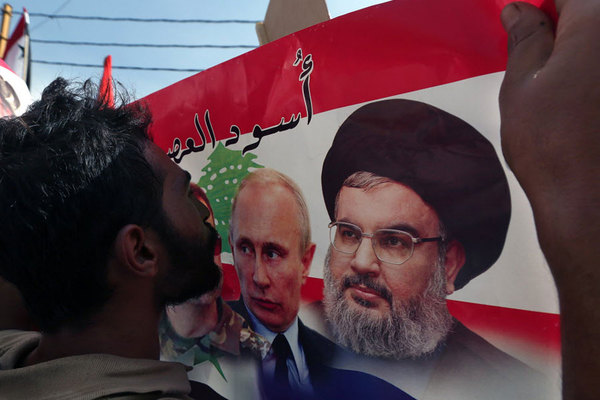
The offensive in Quneitra province, in part intended to reverse recent rebel gains in the area, underlines the importance Shiite Hezbollah and its patron Iran attach to the strategic territory near the Israeli-occupied Golan Heights.
The operation could cast light on whether Russia and Iran, the two main powers supporting the regime of Syrian President Bashar al-Assad, have agendas that coincide or diverge. It also has the potential to test how far Russia is willing to extend its air power in the country.
Last week, a senior Iranian officer was killed in battles in northern Quneitra province, and two weeks ago, Maj.-Gen. Qassem Soleimani, commander of the Quds Force, the external operations arm of the Iranian Revolutionary Guard Corps, visited Quneitra as part of a tour of Syrian front lines to rally troops.
“Quneitra is vital for us. We will retake the entire province, God willing,” says a Hezbollah unit commander who fought in a failed Iran-led offensive in the same area earlier in the year.
The bombed-out city of Quneitra, the provincial capital, lies in a United Nations-patrolled zone established to separate Israeli and Syrian forces after the 1973 Arab-Israeli war.
Restoring the province to the control of the Assad regime would allow Hezbollah to extend its front line with Israel from Lebanon’s southern border into the adjacent Golan Heights, opening up the potential for attacks into the occupied volcanic plateau first seized by Israel in the June 1967 war.
The Golan has been one of Israel’s quietest borders for 40 years, but since the conflict in Syria erupted in 2011 there have been a series of attacks against Israeli troops along the demarcation line, mainly involving roadside bombs or rockets.
Rebel groups run several training camps just north of the town of Quneitra beside the “Alfa Line,” the UN boundary marking the eastern limit of Israeli forces. The proximity of the Israeli military serves as a shield for the rebel groups as it deters the Syrian Air Force from staging raids so close to the Alfa Line. Last year, Israeli forces shot down a Syrian jet after it strayed into Israeli-controlled territory in the Golan.
In February, Hezbollah spearheaded an Iran-directed offensive to seize the bulk of the Quneitra and adjacent Deraa provinces in order to establish a toehold opposite Israeli lines. However, the offensive quickly bogged down amid bad weather and stubborn rebel resistance and was abandoned in early April.
Last month, Syrian rebel groups launched an offensive in northern Quneitra in a bid to punch through regime lines to reach the Western Ghouta region west of Damascus. After five days fighting, the rebels, including Jaish al-Islam, Ansar al-Islam, and Al Furqan Brigades, seized several strategic hilltops from the Syrian Army.
Hezbollah reinforcements were dispatched to northern Quneitra, bringing the group’s area deployment to around 500, according to a Lebanon-based security source. Hezbollah, supported by the loyalist National Defense Forces and Syrian regular troops, quickly retook the rebel-seized terrain as well as further rebel-held areas.
It is unclear for now whether the Hezbollah-led counter-offensive will seek to gain further territory or settle for the stabilization of the front. Israel has repeatedly warned it will not allow Hezbollah to establish a new front in the Golan, and in January, Israeli drones killed an IRGC general and several high-ranking Hezbollah militants near the town of Quneitra.
But the Russian military intervention in Syria complicates the calculations of both sides. Israel and Russia have established a channel of communication to prevent misunderstandings between their respective air forces. But if Israel stages an attack against Hezbollah forces in the Golan, it will embarrass Russia, Iran’s battlefield ally. On the other hand, it is highly unlikely that Russia would respond militarily to an Israeli attack in the Golan area.
“Israeli bombing of Iranian and/or Hezollah assets in Quneitra will go down badly and must taint Russia as well,” says a European diplomat with extensive knowledge of developments in Syria. “One might suspect that there is an understanding between the Israelis and the Russians that the Iranians and Hezbollah would do nothing to explore their new advantages in the Golan area.”
CSM

Leave a Reply
You must be logged in to post a comment.